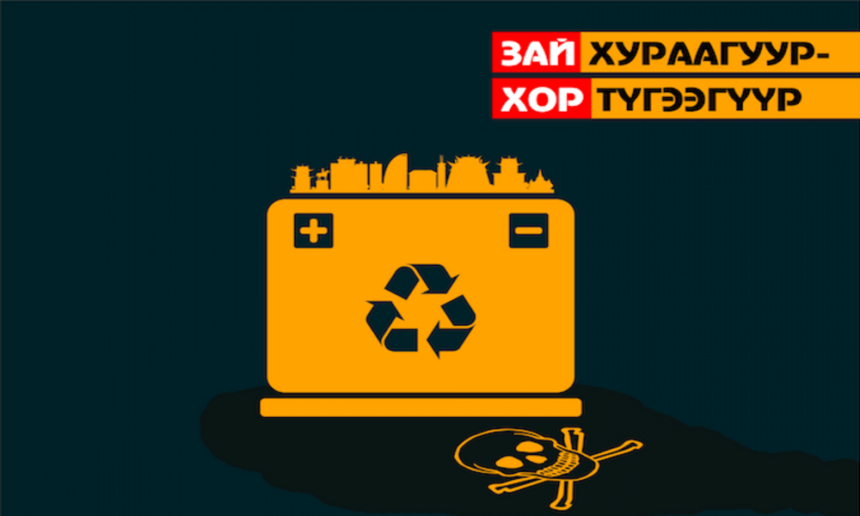As our battery usage grows not only in homes but also in other spaces, we’re also having to dispose of an increased volume of batteries. However, the dangers associated with used batteries are not well known to everybody. When disposed of improperly, all types of batteries pollute the environment, contaminate water with harmful substances, and have serious adverse impacts on people’s health. But our government is still unable to monitor and control the situation. In the meantime, people continue throwing away used batteries into the exact same bin as other household waste.
Waste separation is something that is not well embedded in people’s behaviors yet, and Mongolia doesn’t have a single waste recycling facility. Although the government issues dozens of programs and plans, almost none of them resulted in any material work. How long are we going to ignore the fact that batteries present toxic hazards and keep disposing them in open space, degrading the environment for future generations?
Use of batteries
With a population of 3.2 million, Mongolia imports 6 million portable batteries a year.
As of 2018, light vehicles (cars) comprised 72 per cent of all 585,000 vehicles inspected under the national mandatory inspection. Eighty-three per cent of those cars were Japanese cars that have the driving wheel on the wrong side, for right-hand driving, and majority of them were secondhand Toyota Priuses with a hybrid engine that uses both gas and electricity. In Japan, people get paid 2,500 USD upon delivering their 13-year-old car for disposal. That’s where Mongolians come in and buy that car for 5,000 USD. The batteries of these Priuses then driven in Mongolia are often replaced, whereby the old batteries end up in the same landfill together with everything else.
Hazards
Batteries contain heavy metals that are carcinogenic can cause mental defects, the deterioration of internal organs, and harm the reproductive system. The vast panoply of potential and real risks to human health can simply not be understated. For this reason, the government categorized batteries containing lead, nickel, cadmium, and mercury as hazardous waste. Battery acid and electrolyte also fall under this category. However, the existence of categorization does not mean that associated hazards have been controlled. This is especially dangerous since Mongolians have a habit of biting AAA batteries to lengthen its life, while kids sometimes play with batteries and accidentally swallow them.
As a reaction to complaints from people, the relevant government agencies recently completed a set of inspections and investigations. They visited three different companies that disassemble car batteries at a location southwest of Khonkhor Urtuu of the Nalaikh District, melt the extracted lead, and export it to China. Korea, China, and Mongolia respectively invested in these companies. Every day 1-2 tonnes of car batteries are bought from people at a price of 1,600 MNT per car battery, chopped up with an axe, and molten into lead bars. According to the company, the sulfuric acid from this process is locked up in concrete units placed in the ground. However, it was revealed that the sulfuric acid leached into our soiland has been contaminating the Tuul River basin for years. We’re only scratching the surface here, and there are dozens of unknown companies contaminating the environment in the same way.
Expired automotive batteries produce a variety of toxic substances, while one AAA battery contaminates four square meters of soil and 8,000 liters of water. Used AAA batteries in a waste pit completely disappear only after 100 years.
Solution
The use of batteries, regardless of type, is ubiquitous and ever increasing. When it comes to disposal, batteries are either buried or burnt in Mongolia. One company collected several tonnes of batteries attempting to send them to Japan. However, the transit transport of toxic substances is not allowed in our neighbouring countries. We have no choice left but to collect used batteries, sort them, and start recycling.
Mongolia has a law on waste, but we are still unable to find capital to fund a recycling facility or select a location to build the facility. There are some odd locations where used AAA batteries are collected, but they don’t know what to do with them next.
Therefore, the most effective approach would be to start imposing a tax on importing and selling batteries and use the revenue to build a facility that collects and recycles used batteries. This can be managed by a company that meets a specific set of criteria.
2019.07.24
Trans. by B.Amar












